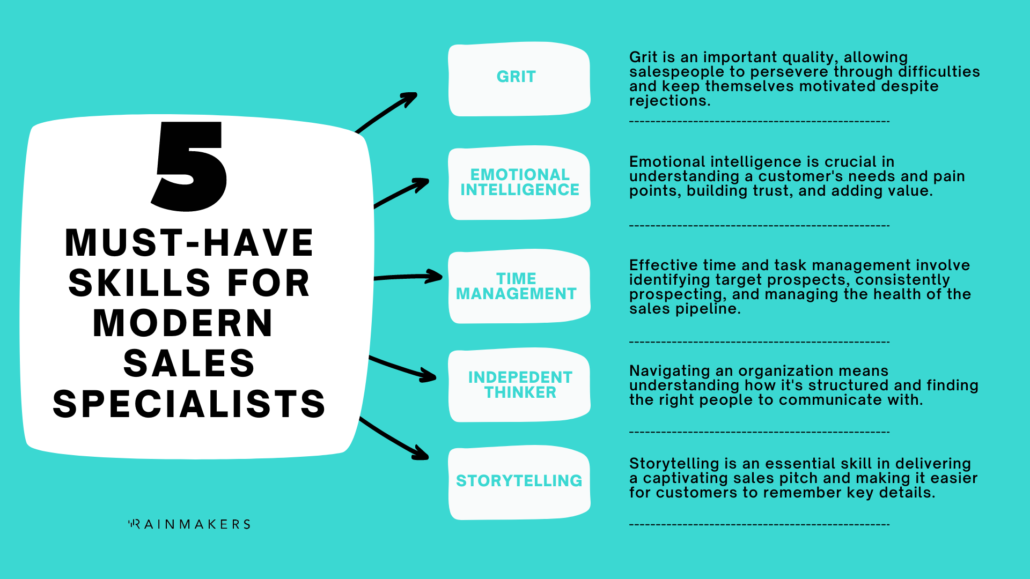Top 5 Fundamental Skills Needed To Succeed In Tech Sales
Best Skills for Tech Sales
In this article, we’ll break down the top 5 critical sales skills essential for high performance in tech sales.
When it comes to sales professionals, there are the good ones, the bad ones, and the ones that are simply great at what they do.
The bad ones are easy to spot. They’re the ones giving the profession a bad name and tend to fit in with the negative stereotypes we see and hear about in the media. Bad salespeople tend to focus only on themselves and what they stand to gain in making a deal happen. They give little thought, if any, to how the deal will impact their customer. They’re also usually very disorganized and sometimes even outright dishonest about the terms of the agreement.
All this amounts to a horrible customer experience and one that will not keep them around for very long. This commercial about a badger personified as a used car salesman, though fictional and exaggerated, provides a perfect example of what a lousy salesman is likely to act like:
Good salespeople are a little different in that they don’t work with customers in a way that leaves a bad taste in their mouths. They’re usually pretty friendly and diligent in getting their work done. They deliver on what’s promised and do their best to live up to expectations but where they fall short is in failing to go above and beyond. Most average salespeople are just that. Average. These are the guys that, as most would say, go through the motions. They approach their work as something that needs to be done rather than taking pride in the fact that they’re able to provide value to their customers.
That’s where great salespeople set themselves apart. Great salespeople take pride in what they do and live for the mission of continuing to provide that value. So how do you go from being an excellent salesman to a great salesman? Of course, many factors affect what makes a great salesperson, and those factors will likely vary depending on who you ask. However, a targeted list of critical sales skills will go unequivocally up your sales game if you focus on developing them.
1. Grit
According to Angela Lee Duckworth, grit is the most significant predictor of success and even more important than IQ. Grit is the ability to continue pushing yourself to work hard despite seemingly insurmountable odds. People with high levels of grit can keep themselves going even when others have lost hope and given up.
This is directly relevant in the world of sales because let’s face it, sales is a numbers game. There may be lucky streaks where you find a series of wins in a short time, but more often than not, you’ll have to comb through a hundred “no’s” before you make it to that elusive “yes.” Those hundred “no’s” can start to feel like an eternity.
What often happens is that after hearing no for the first 30 or so times, many salespeople start to lose their fire. Each failed attempt seems to chip away at their hopes of success, leading them to lose vigor. Even more so, some salespeople also seem to give up from simply being unable to get a hold of someone and assume that a lack of response means a lack of interest.
Great salespeople go to great lengths to ensure they get an answer from their prospect, whatever that answer might be. They’ve developed a thick skin and can persevere in the face of all these difficulties, knowing that it’s only a matter of time until all their hard work pays off and they land that one colossal success that makes it all worth it. They don’t let the small losses affect them because they understand that these are minor roadblocks in their inevitable path to success. They’re professionally persistent and optimistic that an opportunity always exists until there’s definitive proof that demonstrates otherwise.

2. Emotional Intelligence
Great salespeople are also very effective at understanding their customer’s needs. The reason they’re so great is because of something that’s widely known as emotional intelligence. They can put themselves in their customer’s shoes to understand what’s important to them. What are the needs versus the wants? What are the most significant pain points and challenges the customer is facing? What are the risks involved with going forward or not in the future with the deal from your buyer’s perspective? These are all questions that a great sales professional should easily be able to answer when evaluating a deal.
They understand that the customer is not concerned with how extensive the commission check will be and are more focused on the value they will recognize from buying the product or service offered. The greats can realize that if they correctly identify this value, they can quickly use that knowledge to close business with agreeable terms.
Another reason that great sales professionals develop their emotional intelligence is that they understand that there’s a premium associated with trust. Trust will beat price any day, which is why brands people know and love are valuable. Unless the price is the most critical factor in your prospect’s criteria, building trust and value is the best way to increase your odds of winning that deal. On the other hand, if the price difference is marginal, the customer will almost always go with the vendor they’ve developed the most trust with during the buying cycle.3.

3. Time and Task Management
Being busy does not always mean that you’re being productive. So you’ve made a hundred dials today and had 15 or so conversations? So what? If those 15 conversations were with the wrong people or companies that don’t fit your ideal customer profile, you might find out in a few weeks that those opportunities may never amount to anything.
In sales, there truly is a benefit to working smarter and not harder. Therefore great salespeople know how to effectively manage their time and recalibrate their focus on the most critical priorities. They identify the target companies and prospects with the highest likelihood of bringing in business and focus extensively on those.
Those highest on the leaderboards are also very aware of the health of their pipeline. They recognize that even if they have a ton of deals currently in the works if nothing is filling up the top of the sales funnel, they’ll eventually find themselves with a dead pipeline somewhere down the road. Therefore these guys are ALWAYS prospecting, no matter what. Additionally, suppose they work at an organization that doesn’t provide business development support. In that case, they find the time to put in even a few hours each week to ensure they find ways to continue feeding their pipeline. In doing this, they can keep their results consistent, unlike the average sales professional who may fall victim to more streaky sales due to improper pipeline management.

4. Navigating an Organization
This may seem straightforward, but a little finesse is required to navigate an organization effectively. Most people probably think you need to get a hold of the proper titles with the right message, and everything will be golden, but that’s not always the case.
In some situations, you may catch someone on an off day and, therefore, won’t be open to any messaging, no matter how it’s positioned. Additionally, there’s always the chance of something getting miscommunicated or misunderstood. Therefore it’s essential to understand how your prospective company is organized so you can use that knowledge to your advantage when trying to figure out who the best alternative people are to reach.
For example, let’s say you pitched to a Director at Company A, but for some reason, they didn’t buy into your value proposition as strongly as you would have liked. As a result, the deal cycle stagnates, and little activity is happening within the account. You’ve sent 15 emails and dialed them over ten times. Instead of nagging that same person and potentially souring the relationship, finding someone else who can champion your company internally may be better. However, there would be no point in reaching out to anyone else in the same team as it would roll back up to the same Director, and they will ultimately come to the same conclusion that your company’s value is questionable.
Instead, you should understand how the company is mapped out and find another relevant Director or someone at the VP level to re-pitch your product or service. Explain things to your new prospect in a way that makes sense to them, and let them convince your old prospect to change their mind. The same message can sometimes be received very differently depending on the source.
5. Storytelling
Of all the skills on this list, the ability to effectively tell a captivating story is probably the most important. Something about the human mind makes it easier for us to remember stories better than lists of facts. Great sales professionals use this to their advantage by weaving their value propositions and previous achievements throughout a story.
Where the average salesperson may come to a meeting to ‘show up and throw up, the seasoned professional will take a minute to bring some calm and comfort into the situation. Next, they’ll spend a few minutes building up rapport and then find ways to lead the conversation toward how their company works with or has worked with other clients for their benefit.

Compare the following two examples.
Example 1:
“Hello Mr. Client, thank you for your time today. I’d love to talk to you today about the new amazing features our product is capable of and how it will benefit you moving forward. With Feature X, your employees will be able to accomplish their daily tasks with 15% greater efficiency. Additionally in switching to our product, our other clients are also seeing cost savings as high as 5 to 10%, resulting in an average ROI of 135%. Most importantly, we keep our customers happy and can even prove it with our 95% retention rate.”
It might get a few people’s attention, so not bad. But…
Example 2:
“Hello Mr. Client, thanks for taking the time to speak with me today. I understand that you’re currently looking for a new solution that can help you save some money while also helping increase the productivity of your employees. Is that correct? Great. Let me introduce you to Acme Corp, one of our current clients. Their business isn’t exactly the same but it’s fairly similar to yours and they actually approached us because they were facing issues that mirror much of what you’ve been telling us about so far. They’re workforce was not as productive as they would have liked and they thought they were overpaying with their previous vendor. After switching to our product, they were able to increase their company’s productivity by 15% and save 8% on their yearly contract. After only 2 years of using our product, they realized an ROI of 135%. To this day, John, their CEO, says that he couldn’t be happier with his decision, which is actually not uncommon for us to hear given that we have a retention rate of 95%.”
Perhaps not the most eloquent examples, but I hope it makes my point. Given that it will likely be a few hours or even a few days before your prospect will have to share their thoughts with the rest of the team on what you’ve presented, it will be the second example that will be the easiest to remember. Unlike the first example, it juxtaposes the situation before and after the decision to do business with your company and does so in a logical manner that’s easy to follow.

There are, of course, many other skills an actual sales professional will likely want to develop beyond those on this list, but focusing on these five should be a good start for those looking to get themselves to the next level. So, if you’re lacking in any of these areas, spend the next few weeks working on developing these skills. You may be surprised at how quickly they will start to impact the success you’re seeing with your deals.
Are you ready to exceed expectations at your next sales job? Browse companies that are currently hiring and create a Rainmakers profile!










